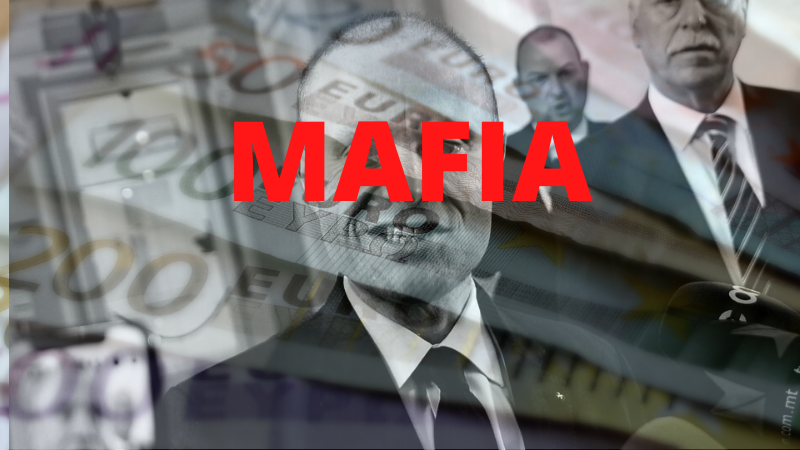Veteran crime and corruption investigative journalist and co-founder at OCCRP, Drew Sullivan, has called out Malta as a possible “mafia state” that “really looks like it works on behalf of criminal groups”.
The comments were made during an interview conducted with Sullivan by the Global Investigative Journalism Network executive director David E.Kaplan. It forms part of a series on mafia states which the author defines as “countries that essentially operate as a criminal cartel and run the affairs of state much as a crime syndicate runs rackets.”
Both journalists are considered experts in their fields. Kaplan has over 30 years of experience writing about crime and corruption and has published three books on criminal gangs. Sullivan’s work at the OCCRP has been instrumental in exposing organized crime around the world.
Since the project was launched in 2005, more than $37.3 billion in fines and seized money has been accumulated due to their stories. In addition, there have been more than 100 resignations and firings, as well as hundreds of arrests and indictments.
Sullivan explains in the interview that mafia states are relatively rare but that there are many kleptocracies where the government steals from the state and people. In terms of mafia states, he estimates there are around five or seven, including Malta.
“Their mission is basically to be a mafia-like organization. They intend to operate the state as a criminal enterprise to further criminal interests,” he said.
When asked to list the mafia states in question, he states that the “great mafia states” include Kosovo and Montenegro, adding that “Malta is probably pretty close.”
Later in the article, he discusses how Kosovo and Serbia are mafia states where the government actively works with criminal gangs who fund politicians.
He continues that Malta appears to work on behalf of criminal groups and lumps it together with Equatorial Guinea.
When investigating mafia states, Sullivan explains that it’s easier to investigate a state as they are often more transparent.
“You piece together the hierarchy of the organization starting at the top, as you would with a crime gang. There are informal networks within the government that are more important than formal networks often. So you figure out the most important people…You look at who’s getting wealthy, who’s got the nicest house….”
He added that it’s essential to look at the people surrounding the person of interest. This could include lawyers, family members, and other individuals. Then, you have to look closely at the assets under their names.
“It’s gotta be someone they trust,” he added.
In 2019, the OCCRP awarded disgraced ex-Prime Minister Joseph Muscat the “2019 Person of the Year in Organized Crime and Corruption” award.
While this plaque is unlikely to be hanging on his wall, it was received with interest by journalists pursuing links and allegations of organized crime between him and various other figures.
The article that accompanied the award referred to Malta as “a tiny nation in the grip of large-scale criminal interests.”
It continued that under Muscat’s two-term leadership before he was forced to resign, “criminality and corruption have flourished” and primarily gone unpunished. It references the investigation into the assassination of Daphne Caruana Galizia, which had “foundered for years” but noted his nearest and dearest arrests, including disgraced ex-Chief of Staff, Keith Schembri.
“Muscat has shown total disdain for the media, free speech, and has allowed corrupt figures to order killings wiht impunity,” said Louise I. Shelley, founder, and director of the Terrorism, Transnational Crime and Corruption Center at George Mason University.
Other candidates for the award included ex-President of the United States Donald Trump, his attorney Rudy Giuliani, and Denis Christel Sassou Nguesso, the son of the President of the Republic of Congo.
The latter was accused of siphoning $50 million from the Congolese treasury. He was also implicated in a 2018 OCCRP investigation, along with other family members, of accepting millions of dollars in bribes related to Congo’s oil fields.
The panel of judges found that Muscat’s actions “constituted the most extreme form of corruption”.













Malta will never be able to get out of the FATF’s Greylist unless there is a radical change, that is, a change in government..
Oh yes it will get out of the Greylist, straight into the Blacklist!
The lack of transparency by prime minister Robert Abela to show how he acquired his wealth when he was a consultant and advisor to Joseph Muscat doesn’t help much to clear the air. If things remain as they are I wouldn’t be surprised if Abela in the near future would be awarded the same title.
Buying houses and converting them into blocks of apartmemts, thats how he got his wealth! Ghalhekk dal bini kollu ghax kullhadd imdahhal! L aqwa li lil poplu bellawielu li l kantun kollox!
Another certificate. What a disgusting place this Mafia rock has become. I pity the young generations having to carry the burden of these corrupt bastards. The corrupt ministers don’t give a shit cause they will send their children abroad.
They are all with property abroad! Truly bastards!
It is not only Malta as a state, that should be blacklisted, but also its government representatives. They should refuse to accept state visits and they should not invite them to International fora.
Malta is FIRMLY ensconced in crime. RIGIDLY.
What has been going on in Malta is wicked. Superlatively wicked. But no country gets a free pass. The hunkering for endless money and power is global. In certain countries corruption is conducted in more subtle forms.
https://www.opendemocracy.net/en/dark-money-investigations/petition-dark-money-uk-politics/?source=taggable-block&fbclid=IwAR0JUD1qq556XjNTlF_4qKiM6YUkheC6W49HChxfJ2qLSnaujN7NI8LxDCw
This decade has been (hopefully, soon to become a ‘has-been’) an era when rampant global corruption triggered by upper echelons has flourished.
It does feels like a very full-blown conspiracy against common decency.